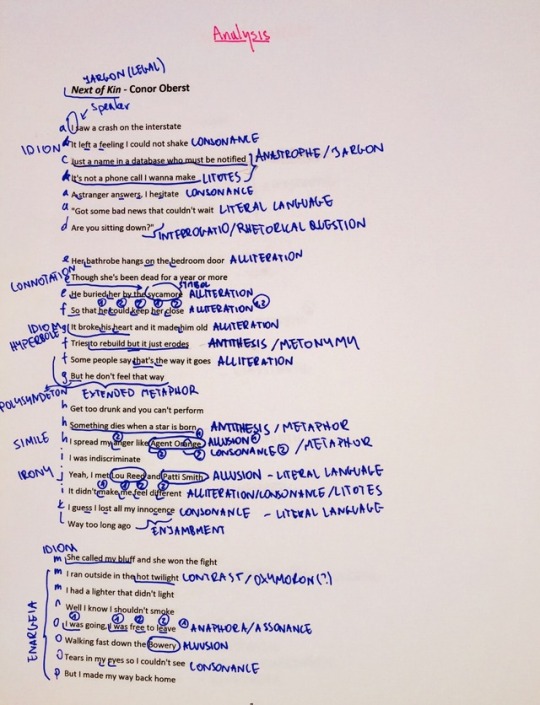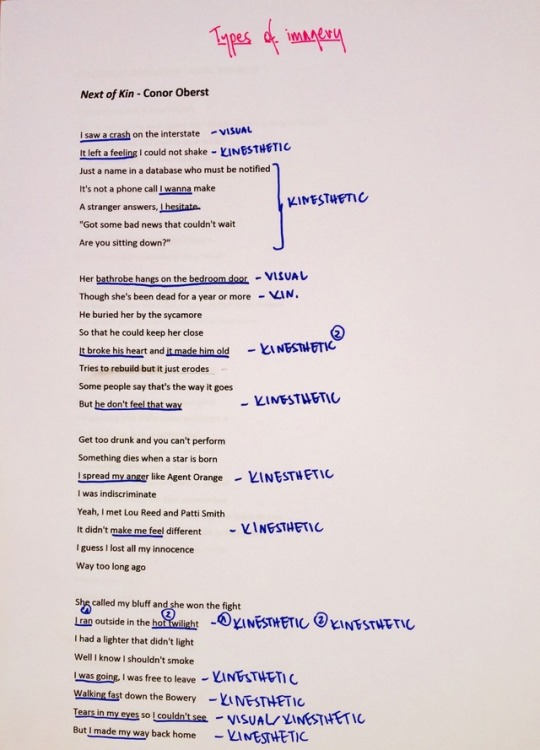I'm Anja and I do this (for real) about | helpful glossary | q&a
Don't wanna be here? Send us removal request.
Note
do mambo no. 5
I may do this actually so everyone finally realizes that it’s not merely on shagging women but appreciating the act of love worshipped in the name of polygamy
lol
1 note
·
View note
Photo



Artist: Conor Oberst Author: Conor Oberst Album: Ruminations Year: 2016 Genre: alternative/folk/anti-folk
TITLE
A “next of kin” (NOK) is a person’s closest living blood relative or relatives. It is a legal definition in the United States (where Conor lives). According to legal systems, in cases of medical emergency, the next of kin may participate in medical decisions when their relative is incapable of such. This term is not used anywhere in the song itself, except for the title. Its nature, related to legal issues (jargon), may indicate that the author wants to separate himself from the issues presented in the song (death, loss, hopelessness) by using a term which doesn’t necessarily have any emotional connotations in order not to feel sadness himself. He may also use it ironically to point out that people, when in difficult, life-challenging situations (such as death of a beloved person), are limited to the system and its bureaucratic procedures, having no room left for sentiment, nostalgia and pain.
VERSE 1
The speaker admits to seeing a (supposedly) car crash on the interstate highway which moved him deeply to the point he couldn’t get rid of the feeling. The crash must’ve been fatal, with certain person(s) dead as a result, since he ironically points out that the dead person’s relative (next of kin?) must be notified, as restricted in a database. The speaker now reveals that he is, in fact, to notify the relative. He again admits that he feels uneasy as he doesn’t want to call that person nor inform them. Did he know the deceased? Does he know the relative? Or is he just as empathetic? He tells the relative that he has bad news and asks them to sit down to not fall unconscious (possibly). It’s worth to notice that the mentioned “interstate” sounds similar when pronounced to “intestate” which refers to the condition of the estate of a person who dies without having made a will or other declaration.
VERSE 2
We now switch to a different scenery. We’re presented with an image of a bathrobe hanging on somebody’s bedroom door. It belonged to a woman who’s clearly a year gone by the time. Her closest one, possibly a relative, a man (a husband? partner? father? brother? A partner more than anyone else, given the image of a shared bedroom) buried her body by a sycamore, a tree which in Catholicism symbolizes clarity (Zacchaeus climbing it to see Jesus clearly among a crowd of people). The tree is a symbol of place in the lives of Catholics where they’re able to have a clear vision of Jesus, their savior. In Egyptian Texts, two sycamore trees stood at the eastern gate of Heaven. Between the trees the Sun God, Ra, showed himself each morning. It is believed that a sycamore tree and its valuable wood (often used to carve sarcophagi, or coffins) was a symbol of protection for the Egyptians during the journey from life to death. I think it’s safe to say that the author could’ve had both symbolic connotations in mind. He tells us that the man, grieving his wife’s death, buried her under the sycamore. By “the” & the following line we know it’s not a random one, but possibly a tree growing in their garden or somewhere near home, since the man wants to “keep his wife/partner close”, aka wants to have “the best view” to visit her grave often and to have it protected, near. We’re later told that “it”, the man’s partner’s death was devastating to him both emotionally and physically. It “made him old” which may refer to him changing physically (people’s hair, for example, can turn gray within seconds of a traumatic experience) or/and mentally (loss of a loved one is a life-changing experience which provides people with both trauma and knowledge). The man tries to “rebuild” something. His heart? His body? His life? His faith? but he can’t do it, because it deteriorates instead. He’s told by people that that’s the routine of life, that’s what happens - death is real and will affect you, everyone experiences loss, you can’t do anything about it, but he doesn’t want to deal with it that way, he’s unable to come to terms with it.
VERSE 3
Now the speaker addresses the listener/reader. He tells us - “you” - that you can’t perform onstage when you drink too much. When a “star” is born something needs to die - he paraphrases the issue presented e.g. in Andersen’s tale “The Little Match Girl” where the protagonist is told by her grandmother that when somebody dies - a star falls from the sky. The speaker, possibly the author himself, knows the difficulty of being a known artist - drinking problems, the possible loss of one’s true identity which needs to “die” in order for their new image - “a star” to emerge, to please the audience. It doesn’t only need to refer to a musician/artist’s fate though, because one doesn’t need to be a singer to “perform” aka present, carry out, fulfill or accomplish anything. This verb may refer to any actions one can take, including the most basic ones. “Get too drunk” = make yourself unstable so you can’t do anything right. One thing also has to end in order for something else (sometimes better) to start. For us, for the speaker, for the author. For everyone. Later, the speaker clearly shows us his own perspective on the issues as he admits to having “spread his anger like Agent Orange”. Now, Agent Orange is a defoliant, most notably used by the U.S. military during the Vietnam War which caused major health problems for anybody who was exposed to it. By “spreading his anger” like a chemical the speaker confesses that he was open with his negative emotion in a toxic, contaminating and damaging way, to himself and other people, probably. He then admits that he did randomly, against the better judgment, as being “indiscriminate”, just like Agent Orange affecting the lives of Vietnamese people. He talks about how he met Lou Reed and Patti Smith (both valid counter-culture icons of the 70s, musicians and poets, self-taught and independent, charismatic) which didn’t have any crucial impact on him anyway. He thinks that yet another loss - of innocence, made him indifferent already. Also, you should never meet your heroes.
VERSE 4
Who’s a “she” mentioned at the beginning of the first line? That’s possibly the trickiest line of them all. A partner? A girlfriend? A mother? The aforementioned Innocence? She’s definitely known to the speaker and has the edge over him by “winning the fight”, possibly an argument or a game (like poker) by “calling his bluff” i.e. challenging the speaker to reveal his real intentions (like a card) to unmask him and show his weakness. “She” is smart and skilled. The speaker, as a result, runs away and notices the night has already begun. It is hot, too which can be unusual to some of the listeners since there’s no more sun at night thus the heat decreases. He points out that he has a lighter which doesn’t seem to work and admits that he shouldn’t smoke anyway. The lighter may symbolize the urge or possibility to do nasty things which never seem to work thus it’s better for the speaker to not continue on this path. He says he’s already on his way, “free to leave” as though he can go away already, not restrained nor limited anymore. He walks down the Bowery, fast. The Bowery is a street and neighborhood in New York City. The area was infamous for the number of low-brow concert halls, brothels, pawn shops and flophouses, welcoming all those considered outcasts or degenerates. This line can make the “she”-problem clearer then by adding more possible interpretations . A “she” can be a prostitute, an opponent in illegal poker game, maybe. The speaker cries and through his tears, yet another obstacle, he can’t see the road/path/way before him but he admits and assures us that he managed to get back home; to what’s familiar, close, near, comfortable and considered safe, known.
SUMMARY:
Conor Oberst’s “Next of Kin” tells a story of loss and acknowledgement of it. A story of feeling lost and inadequate, nervous and anxious. A story of failing at living with pain. A story of losing innocence, purity and dignity. A story of understanding loss, facing up to it and finding a way to what is always there, sometimes abandoned and neglected - home. Our own sensible selves.
#Conor Oberst#Bright Eyes#Ruminations#Conor Oberst lyrics#Lyrics analysis#Lyrics interpretation#Poetic analysis#Poetry interpretation#Poetry analysis#Poetic interpretation#2016#Song analysis#Song interpretation
8 notes
·
View notes